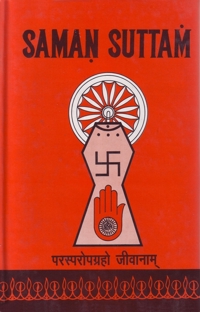THE PRECEPTS ON NON-ABSOLUTISM
Jena vina logassa vi, vavaharo savvaha na nivvahai.
Tassa bhuvanekkaguruno, namo anegamtavayassa. (660)Without whom, even the worldly affairs can not be carried out, I bow to that Anekantavada (nonabsolutism), the only preceptor of the world. (660)
Gunanamasao davvam, egadavvassiya guna.
Lakkhanam pajjavanam tu, ubhao assiya bhave. (661)The substance is the abode of attributes and the same are inhered by the substance. The distinctive characteristic of mode is that it depends on both. (661)
Davvam pajjavaviuyam, davvaiutta ya pajjava natthi.
Uppaya-thii-bhamga, hamdi daviyalakkhanam eyam. (662)There is no substance without the modes, nor are the modes without substance. The characteristics of substance are origination, permanence and destruction. (662)
Na bhavo bhamgavihino, bhamgo va natthi sambhavavihino.
Uppado vi ya bhamgo, na vina dhovvena atthena. (663)There is no orgination without destruction, no destruction without origination, while neither origination nor destruction is possible without a permanent substance. (663)
Uppadatthidibhamga, vijjamte pajjaesu pajjaya.
Davvam hi samti niyadam, tamha davvam havadi savvam. (664)The origination, permanence and destruction belong to the modes (and not to the substance0, but since modes are definitely of the form of a substance, everything whatsoever is the form of a substance. (664)
Samavedam khalu davvam, sambhavathidinasasannidatthehim.
Ekkammi ceva samaye, tamha davvam khu tattidayam. (665)Since at one and the same moment the substance is subject to three states, viz. origination, permanence and destruction-these three states verily constitute a substance. (665)
Padubbhavadi ya anno, pajjao pajjao vayadi anno.
Davvassa tam pi davvam, neva panattham neva uppannam. (666)The mode of a substance which emerges is one and that which vanishes is other than it, while the substance neither emerges, not vanishes. (666)
Purisammi purisasaddo, jammai-maranakalapajjanto.
Tassa u balaiya, appajjavajoya bahuviyappa. (667)The individual remains the same person from his birth till the time of death, though he assumes the various states of childhood etc. (667)
Tamha vatthunam ciya, jo sariso pajjavo sa samannam.
Jo visariso viseso, ya mao.natthamtaram tatto. (668)All the modes of the things which are common to all of them are universal, while those which are not, are particular but both belong to the same. (668)
Samanna aha visese, davve nanam havei aviroho.
Sahai tam sammattam, nahu puna tam tassa vivariyam. (669)The cognitions of a substance are universal and particular and are uncontradicted. This is the right cognition whereas the contrary to it is not. (669)
Piu-putta-nattu-bhavvaya-bhaunam egapurisasambandho.
Na ya so egassa piya, tti sesayanam piya hoi. (670)One and the same person assumes the relationship of father, son, grandson, nephew and brother, but he is the father of one whose he is and not of the rest (so is the case with all the things). (670)
Saviyappa-niviyappam iya, purisam jo bhanejja aviyappam.
Saviyappameva vi nicchaena, na sa nicchao samae. (671)A person is certainly possessed of alternative relationships and aslo assumes single relationship. But one exclusively ascribes to this person either the former or the latter relationship, is certainly not wellversed in the scriptures. (671)
Annonnanugayanam, 'imam va tam va' tti vibhyanamajuttam.
Jaha duddha-paniyanam, javamta visesapajjaya. (672)The particular qualities (of a substance) are mixed together just like milk and water, so it is not justifiable to exclusively distinguish them as 'this' or 'that' quality. (672)
Samkejja ya.samkitabhava bhikkhu, vibhajjavayam ca viyagarejja.
Bhasadugam dhammasamutthitehim, viyagarejja samaya supanne. (673)A monk, who ii doubtful about the meaning of a verse, should adopt without any pride the relative point of view in his interpretation. A wise monk, while dealing with other monks following the right path in their practice of religion, should preach with eqanimity in a truthful and unequivocal langauage. (673)
37. Anekanta Sutra
 Jinendra Varni
Jinendra Varni

